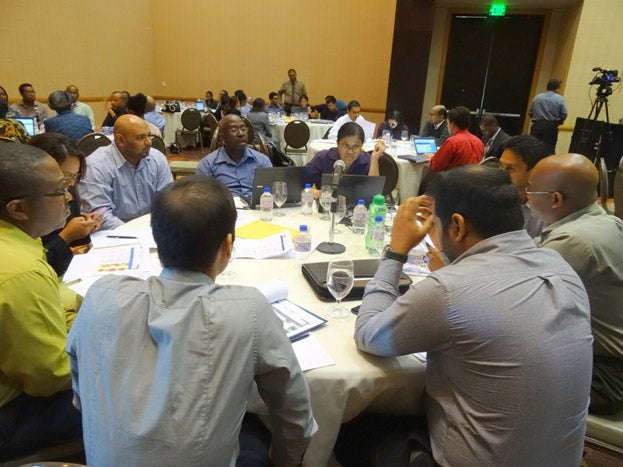The Inter-American Development Bank’s Country Office in Trinidad and Tobago has now completed a series of three sessions that provided opportunities to key staff of executing units (on average 80 persons per session) with responsibility for IDB-financed projects to share experiences and knowledge with each other, other public sector stakeholders and with the IDB’s project teams.
This roundtable experiential approach to capacity building in respect of policies, processes and procedures relevant to planning and executing development projects in a public sector context also provided opportunities for networking. This effort was designed to build knowledge, share experiences and demonstrate the use of tools and techniques that could be effectively employed to manage and lead projects to improve execution, individually, a and by extension, overall portfolio execution performance.
In 2014, key project management themes which were examined included organizational process assets (public sector budgeting and procurement), stakeholder engagement, communications and project risks management. In the case of the latter, project teams were reacquainted with probabilities, pure versus business risks, severity of risks, impacts and responsibility allocation matrices.
Several lessons were shared around the knowledge areas and processes referenced earlier but probably none more poignant than the importance and relevance of “disciplined” project management application. However, it was clear during the consultations that leadership with continuous thinking and planning for project execution in an environment of “organized chaos” was a critical success factor. However, the application of “good” project management knowledge, tools and techniques is necessary but insufficient without innovative and creative project leadership to ensure project success in the planning and implementation of public sector projects. For example, never mind the politics, or maybe consider the politics, think of the chances of success of the implementation of the Health Reform (ObamaCare) in the USA without leadership.
As 2015 approaches, it is anticipated that efforts to build capacity to plan and execute projects will continue within strong emphasis on the project leadership and project governance. Until then, do have a Merry Christmas and a Happy New year!



Dreaming
Silo operation continues to plague Government Service as each department (each IDB project in Trinidad) spends resources to perform the same activities. As early as the conditions precedent to tender invitation and contract preparation and review, time and resources, including financial resources, are spent on the same activity.
Centralizing common activities and doing them as repetitive task under agreed long term arrangements may simply the now arduous tasks and zoom project activities to execution.
The prop to this inefficiency is that each Ministry/Statutory Board has its own legal advisers and each wants its own review. Not withstanding the existence of these luminary minds, there is a responsibility on both the lender and borrower to find means within the system to standardize activities of a similar nature, have long term arrangements/contracts in place that will simplify the process and manage loans from lending agencies in a more efficient and effective manner.
The future…the future…maybe